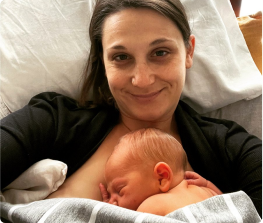Preparing for the arrival of a baby can be exciting, intimidating, adorable, expensive, and everything in between. Once you cross into that third trimester you start to realize that, number 1, you will not be pregnant forever and, number 2, there will be an actual living human that all of a sudden takes up residence in your home and for whom you are completely responsible at the end of your pregnancy journey. That sounds obvious–that the result of a full term pregnancy usually is a baby–but I found that it only really sank in around week 30 that there would be an actual baby, not just a theoretical one. Even after our son was born, during the first month, my husband and I would sometimes look at each other and say, “holy shit, we have a baby!” I’m sure there are some expecting parents who start designing their nursery the day that pee stick showed a plus sign (or a second line, or turned a color or whatever it did to indicate that This. Is. Happening.) but we were not those parents. While I certainly put some of the blame on a busy schedule during my pregnancy that included running a small business, starting grad school, and planning a wedding, I also think there was a part of me that was just downright scared for what might happen when this conceptual bundle of joy became an actual bundle of, yes joy, but also cries, screams, and needs that I had no confidence that I could meet.
I have witnessed, both on social media platforms as well as among my mom friends, a lot more willingness these days to talk honestly about the serious challenges of postpartum. Whether it be struggles with PPD or PPA, frustrations with breastfeeding, the grind of night after night of interrupted sleep, or the general rollercoaster of emotions that the process of birthing a human creates, the immediate postpartum period can be a real doozy. Normalizing these difficulties and the reality that things are not hunky dory just because you have a baby is so important for maternal mental health. That being said, the result of all that increased conversation about postpartum challenges made me really scared of what was going to happen right after I gave birth. I somehow interpreted the message that “it’s ok if you’re not ok,” to mean “it’s ok that you will absolutely, definitely, in no way be ok at all.” As someone who experienced bouts of depression in my early 20’s, I felt sure that postpartum depression was all but guaranteed for me. What I felt like I never heard anyone talk about was how, even with the aforementioned challenges, the immediate postpartum period, especially the first time around, can actually be a period of cozy sweetness that is not just not terrible but, in fact, is downright wonderful.
Drawing inward during postpartum is important not just in order to protect your baby from germs (since my son was born right at the beginning of the Omicron Covid spike, this was an added bonus) but it’s also an opportunity to slow down and connect as a new family unit. My husband and I decided we could do one thing a day in those first couple of months. That thing might be a walk or a visitor but any more than that usually felt too exhausting. And so we gave ourselves permission to do less– not exactly easy for me as an extroverted entrepreneur who always has at least a few balls in the air. I fully recognize that we were able to create this sweet cocoon because my husband could take a significant leave from work and we had help from my parents who live nearby and those privileges made our experience much easier. It goes without saying (although apparently it still has to be said) that the fact that our country doesn’t guarantee a period of paid family leave after the birth of a child is complete insanity. Parents deserve time to slow down, connect with their baby, and bask in the newness of their family. While it is so important that we give voice to all the challenges that postpartum brings, we can also make space for honoring this sacred, sweet time.


